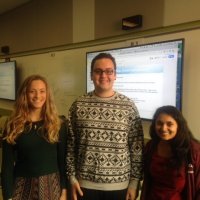
Teamwork is essential to iCons. It is in its blood.
However, working on a team does not always make the job easier – making the team work takes skill. Although teamwork is not explicitly taught, a key element of the iCons way is reflection (a skill that iCons 1 students practice often). Here is one team’s reflection on their first team experience in iCons, where they tackled the problem of antibiotic resistant bacteria in smog.
Team 4 (Achala Narayanan, Alex Main, Erika Allen, and Grace Ortgiesen)
When asked what surprised them about the first case study, the team agreed that they expected group work in iCons – but didn’t realize they were actually going to design and do an experiment! “Having to pull something together in a short period of time with a limited budget…forced innovative and creative solutions”, said Grace Ortgiesen. Getting passed the obstacles made them work together as a group.
They also relished the freedom and flexibility to make mistakes. Alex Main noticed that iCons realizes the value of error, “which you really don’t see in a lot of science classes”. The team felt that the faculty almost encouraged error – and that when the goal was not focused around obtaining a certain result – they were able to focus on their learning, and they added, “a lot of learning is making mistakes”.
All of the members acknowledged that they were used to being leaders in their previous team experiences, and so it took a bit of adjusting to establish roles. Grace noted that in iCons, “every person in our group wants to be here” and how this positively affects the group dynamic. “Delegating happened naturally – based on each of our skill strengths”, Erika Allen said. One of Alex’s favorite things about their team is their ability to engage in peer review– an integral part of iCons. “We’re blunt with each other – we didn’t beat around the bush”, he said. Teammates need to be able to tell each other when an idea is not strong enough to move forward.
On the day of their presentation to the iCons 1 community, Team 4 was a bit nervous. The group that presented before them did almost the same experiment (with much neater graphs!) All agreed though in retrospect, that their presentation was more focused on the learning experience they gained, and so none the lesser. Achala Narayanan smiled, “Across the board when I was watching the presentations, all members were so knowledgeable on the topic…. that’s not something I’m used to, usually two people do all the presenting and the others just stand there…” Not in iCons J
Team 4 is no more now. The members have separated and recombined into new affinity-based iCons 1 teams for their current case study on coral bleaching. It will be interesting for the students to see if choice plays a role in how their teams function.
Team 4 agreed: It is going to be a challenge; but one that will help them grow.
Stay Connected